Written by: Carmen Rueda Lindemann
An Unprecedented Level of Destruction
On October 29, 2024, Valencia and its metropolitan area were devastated by catastrophic flooding, as over an entire year’s worth of rain (500mm) fell in just eight hours, marking Europe’s most severe flood event since 1967. This extreme event was caused by a DANA (Depresión Aislada en Niveles Altos, or Isolated Depression at High Altitudes), which occurs when a cold air pocket at high altitudes becomes isolated and interacts with warmer, moist air below, triggering severe storms, heavy rainfall, and flooding. Such phenomena are common in the Mediterranean Gulf, where warm sea surface temperatures and mountainous terrain amplify these effects. The semi-enclosed Mediterranean traps weather systems, and climate change intensifies these events by warming the sea and increasing atmospheric moisture.
The floods unleashed unprecedented devastation across the region of Valencia, impacting more than 800,000 people in total. In the south-western region of L’Horta Sud, home to over 500,000 residents, towns like Paiporta and Picanya (with 25,000 residents each) report that 90% of residents no longer have access to a functioning vehicle. Further south, in the Ribera Alta and Ribera Baixa regions, home to 300,000 people, the Júcar River overflowed, submerging villages such as Algemesí, Carcaixent, Alfafar, and Sueca. The DANA brought devastation to other regions of Spain as well, such as Málaga and the Balearic Islands, emphasizing the widespread impact of this weather phenomenon.
In terms of the toll on human lives, more than 220 fatalities have been officially reported, while over 36,000 people were displaced or rescued from beneath piles of rubble. Many bodies were never found and are still officially considered missing, or are washing up on the shores of nearby coastal towns, such as el Saler. The aftermath is apocalyptic. Piles of debris reaching meters in height, cover what was once vibrant urban and rural landscapes; a mix of car parts, human and animal remains, trash, faeces, stagnant water, and thick mud.
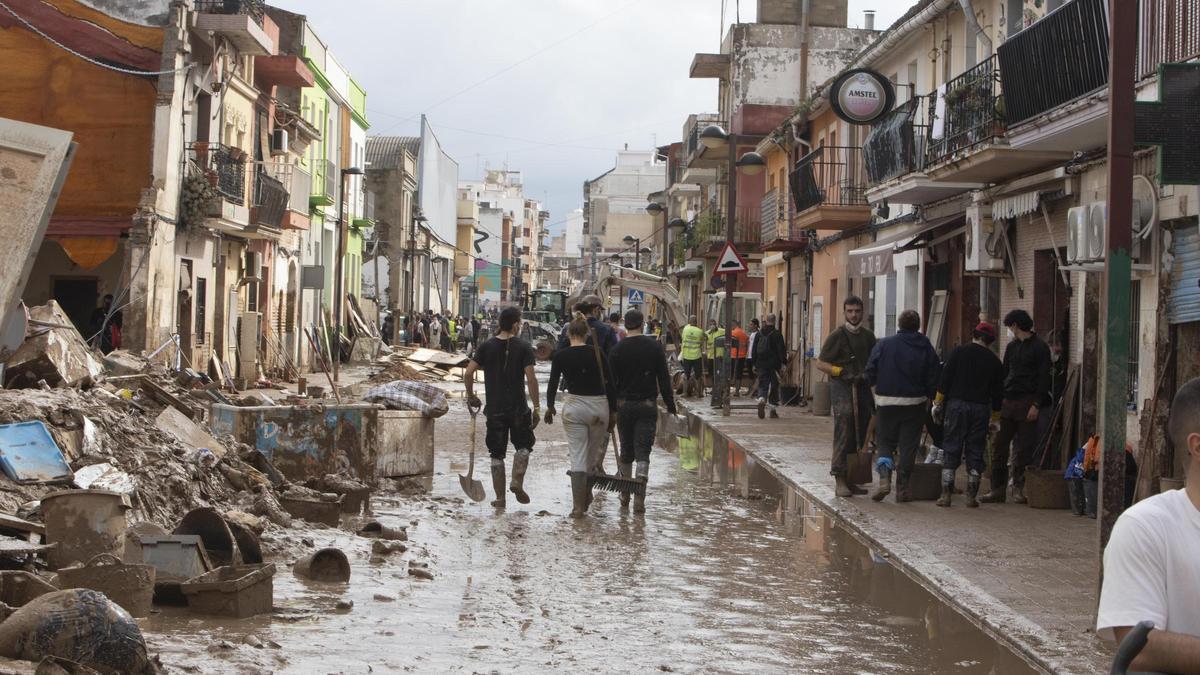
Not Just a Climate Accident: How Political Inaction and Incompetence Exacerbated the Catastrophe
The catastrophic floods in Valencia on October 29, 2024, exposed severe failures on the part of local and national governments, leading to widespread outrage and calls for accountability.
Irresponsible Urban Planning & Lack of Climate Preparedness
Valencia was unprepared for a natural disaster for two primary reasons: 1) Carlos Mazón (the president of the Generalitat – the local government) had dismantled the emergency response unit, 2) he had not invested in an emergency response plan due to his failure to recognise the region’s vulnerability to climate-related events; and 3) irresponsible urban planning and expansion in flood-prone areas, driven by the increase in industry since the 1960s. This blatant negligence left the densely populated areas of L’Horta Sud, Ribera Alta, and Ribera Baixa—home to over 800,000 residents—highly vulnerable to flooding without a contingency plan. This expansion in housing occurred despite repeated warnings from climate scientists about the increasing likelihood of extreme weather in the region.
The increasing frequency of floods across Europe, including recent disasters in Slovenia and Austria, highlights that Valencia’s catastrophe is not an isolated event. These recurring catastrophes underscore the urgent need to heed climate warnings, develop robust disaster management strategies, and invest in climate-resilient infrastructure to mitigate future risks.
In the aftermath of the floods and after months of public protest, the Valencian government launched new measures to bolster emergency preparedness. On December 15, it announced the reinstatement of an early warning unit within the Emergency Coordination Center to better anticipate and respond to future crises. Additionally, a new protocol, effective December 20, permits public employees to stay home during red weather alerts issued by Aemet, prioritizing safety during severe conditions.
Inadequate Disaster Warning & Response
The central and regional governments’ incompetence and failure to effectively respond to the DANA disaster resulted in the loss of hundreds of lives and left hundreds of thousands with nothing. In brief, 1) they did not issue timely or adequate emergency alerts, and 2) essential aid was delayed for days and was insufficient. Almost two months later, 800,000 residents continue to suffer from the lack of aid.
In the days leading up to the 29th of October, meteorological institutes and the University of Valencia warned of the looming possibility of extreme torrential rain in the region, which resulted in several institutions warning their staff to stay home.
On the morning of the 29th of October, the National Weather Service, AEMET, raised their threat level to ‘severe’. Reports indicate that flooding began in the first villages around noon, and by 6 pm, rapidly rising water levels caused widespread panic as communities were stranded, residents displaced and most communities were left without power. By 7 pm, a devastating tsunami-like surge, caused by torrential rain water rushing down from the mountains, swept through villages destroying everything in its path. It was not until around 8 pm, when communities had already reached unprecedented levels of flooding and devastation that an emergency alert finally came from the regional government. On the 18th of December, following months of public outcry, The Spanish Prosecutor’s Office called for an investigation into Mazón, the president of the Generalitat, which centres on his mismanagement during the crisis, particularly regarding his delayed response efforts.
While the regional government holds the primary responsibility for issuing emergency alerts and managing crisis response, the situation sparked intense debate about the role of the national government in such extreme circumstances. Many Valencians have questioned why the Spanish national government did not intervene sooner or declare a Level 3 emergency, which would have granted the central government control over disaster management. A Level 3 emergency would have enabled the deployment of national resources, including military teams and specialised emergency response units, which could have alleviated the immediate crisis.
Critics argue that the delay in the national government’s intervention was a result of political manoeuvring by Prime Minister Pedro Sánchez’s administration, with the decision to not immediately declare a state of emergency being interpreted as an effort to undermine the regional government, which is run by a (far-)right party or coalition, ideologically very different from Sánchez’s own government. By withholding aid and forcing local authorities to request assistance, the central government effectively left the Valencian government in a vulnerable position, delaying crucial help to those in need. Such delays in response raise questions about the effectiveness of the coordination between regional and national governments in disaster situations, particularly when political tensions cloud the focus on urgent humanitarian needs.
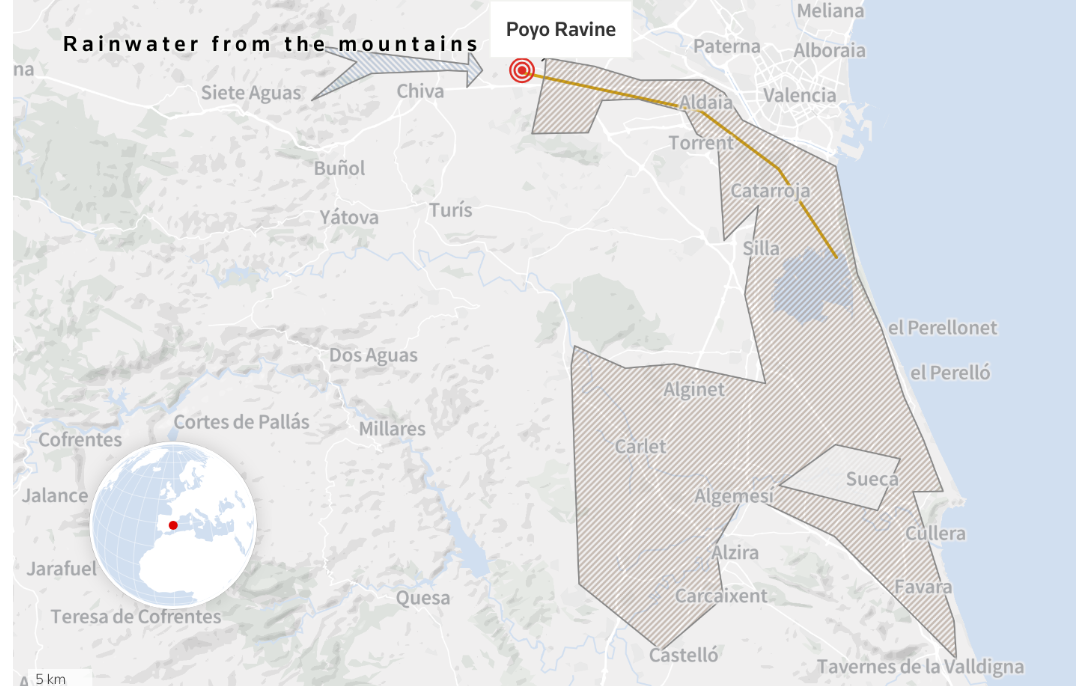
Satellite Images Indicating the Scope of the Flooding on the 29th of October. Source: Reuters
Corrupt Opportunism in the Wake of a Tragedy
After approximately 10 weeks, the Generalitat Valenciana launched several initiatives to support recovery efforts and aid affected communities. On December 19, 2024, the government announced a €250 million aid package, providing €6,000 directly to each individual who had suffered significant damage. This measure was aimed at meeting immediate needs, such as housing and essential supplies. Additionally, recognising the widespread destruction of personal vehicles, the government introduced a program offering €2,500 to individuals who lost their cars in the floods, without requiring them to purchase new vehicles. This initiative, announced on December 20, 2024, sought to alleviate the transportation challenges faced by flood victims. To further assist recovery, €75 million was allocated for the repair of essential water and agricultural infrastructure, which was heavily impacted by the floods. This funding is crucial for restoring services and supporting the agricultural sector, which is vital to the region’s economy.
Amid the flood recovery efforts, concerns have arisen regarding the transparency and ethical conduct of the government’s actions. It has been revealed that the contracts for flood recovery were awarded without public tenders, directly benefiting companies with troubling links to high-profile corruption scandals, including the Gürtel case—one of Spain’s largest corruption schemes, involving bribes for public contracts—and the Taula case. These companies had also been previously convicted of illegally financing the Partido Popular (PP), further raising doubts about the integrity of the process.
Critics argue that such decisions undermine trust in the disaster recovery process and the proper use of public funds, especially at a time when communities are struggling to rebuild; once again demonstrating the prioritization of financial gain over the wellbeing and needs of the people.
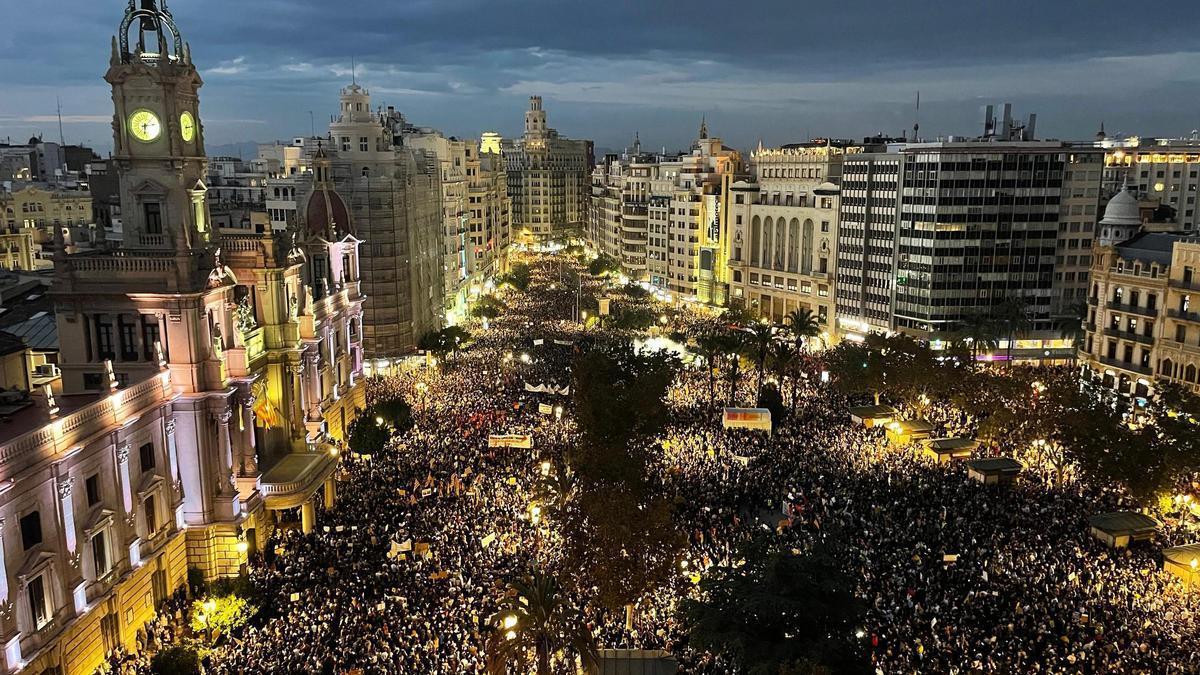
More than 200,000 Valencians manifest to demand the immediate resignation from the local President (9 Nov. 2024)
CLIMATE
The Albufera Natural Park, a UNESCO Biosphere Reserve, has faced unprecedented damage due to the DANA. In less than 24 hours, the park received an influx of water between 50% and 70% more than what it typically receives in an entire year, leading to a catastrophic rise in water levels—almost 1 meter higher than before the storm. This dramatic flooding caused extensive erosion, with over 80% of the park’s floodplains submerged, destroying habitats and further destabilizing the environment of the park. The storm also carried vast amounts of waste into the ecosystem, including plastics, chemicals, and tyres, which pose a direct threat to aquatic life. The floodwaters introduced pollutants from broken sewage systems and other contaminants, disrupting the park’s water filtration system and further endangering species like the European eel.
The long-term ecological impact is profound. Key species that rely on the Albufera wetland, such as migratory birds and endangered fish, face severe habitat destruction, and the ability of the park to regulate flooding and filter water has been compromised. Experts warn that the damage to agricultural infrastructure, particularly the rice fields that form an integral part of the local economy, is also significant. The total cost of restoration is estimated at nearly 10 million euros, underscoring the scale of the environmental and economic crisis. Recovery will take years, if not decades, and will require coordinated efforts across local, regional, and national levels to ensure the resilience of this crucial biodiversity hotspot. This disaster highlights the urgent need for climate adaptation strategies in Europe’s wetlands, which are increasingly vulnerable to extreme weather events.
Finally, researchers suggest that such extreme weather events will become more frequent, challenging the region’s ability to protect its ecosystems. Adaptation measures, including better infrastructure, climate-resilient planning, and sustainable management practices, are necessary to mitigate future damage. Recovery of the park will demand coordinated, long-term efforts to restore biodiversity and safeguard critical ecosystem services.
In summary, the catastrophic floods in Valencia highlight the pressing need for proactive climate adaptation measures and underscore the importance of transparency and accountability in political decision-making. These disasters reveal the devastating consequences of insufficient preparedness and mismanagement, emphasising the need for urgent reforms to protect both communities and ecosystems in the face of growing climate risks.
Satellite Images of València: Preceding and Following the Floods
For a detailed map overview of flood-affected areas: DANA en Valencia – Google My Maps
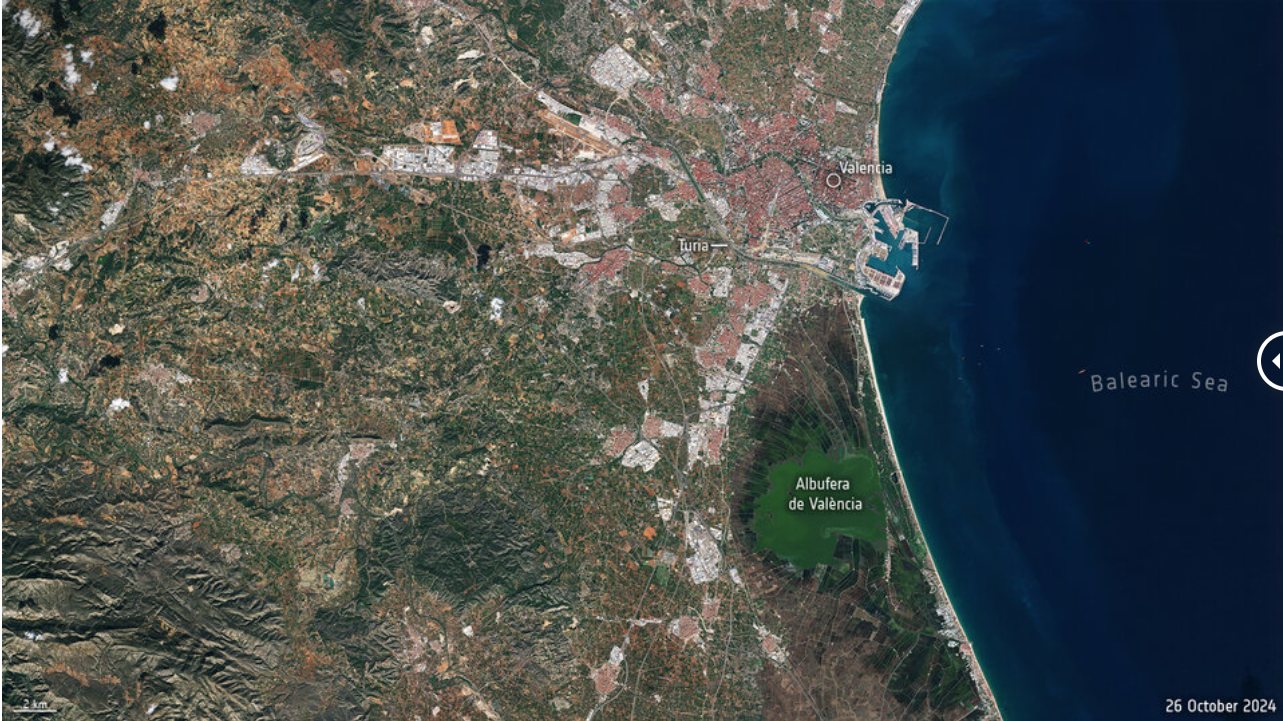
26 Oct. 2024 – Before
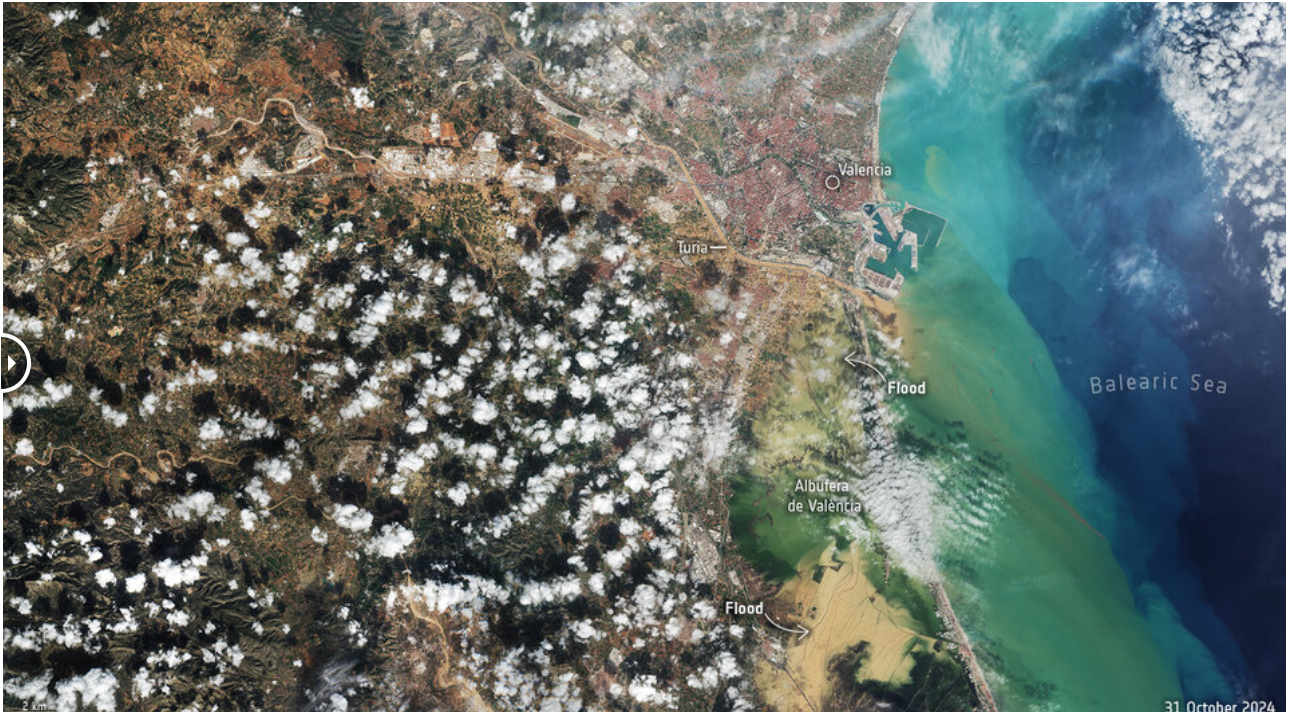
31 Oct. 2024 – After
The Village Saves the Village
Or, as we say in Valencian, “Només el poble salva el poble“.
Despite the central and local governments failing to deploy emergency services until five days after the initial catastrophe and struggling to provide sufficient resources to meet the basic needs of almost 1 million affected civilians, the mobilisation of aid from the people was immediate. In the aftermath of the catastrophic floods in Valencia on October 29, a massive surge of volunteers from Valencia, other parts of Spain, and even abroad came together to assist with relief efforts. This collective response was driven by an overwhelming sense of solidarity and a shared commitment to supporting the affected communities. Within days of the disaster, thousands of volunteers converged on the hardest-hit areas.
Organizers estimated that at least 15,000 people participated in the first coordinated clean-up on the following Saturday. These volunteers engaged in various tasks, including clearing debris, distributing essential supplies, and providing emotional support to survivors.
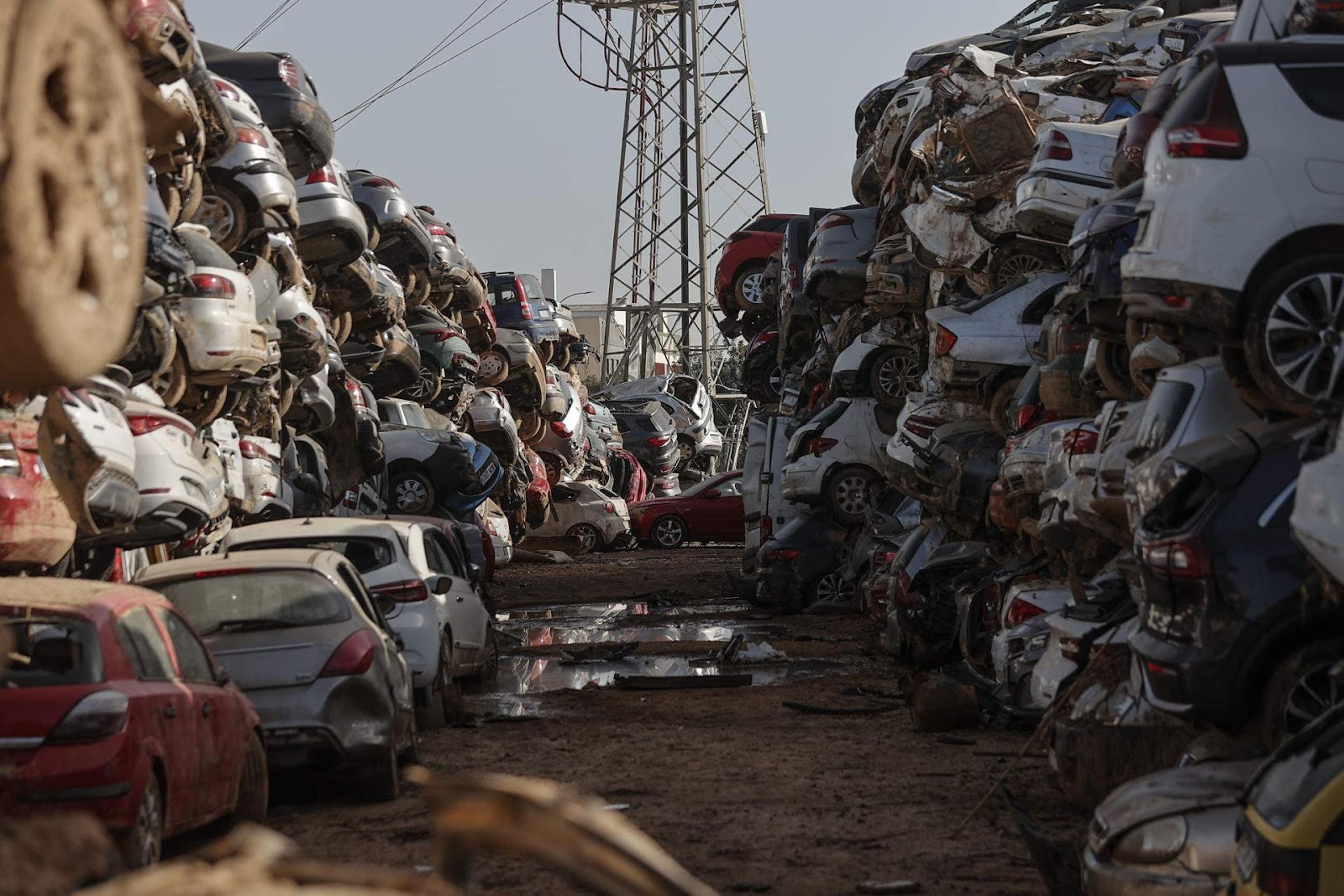
Despite the overwhelming mobilisation of volunteers and donations from international NGOs, the hardest-hit communities still face significant challenges. Reconstruction of essential infrastructure remains a priority, as many families continue to lack access to functioning vehicles, running water, and electricity. Streets are still covered in mud and debris, while parking garages remain unusable and filled with sludge. In light of these ongoing struggles, the Municipality of Paiporta, one of the most severely affected communities, has called for financial donations to support the recovery and rebuilding efforts. The road to recovery for Paiporta is long, but the resilience of its people and the support of volunteers and donors offer hope. While significant progress has been made, the community still needs vital resources to restore basic services and infrastructure. As of 20 December, the municipality has finally restored their running water.
To support the ongoing recovery efforts and help rebuild the lives of those affected, please consider donating to the GoFundMe campaign: Fundraiser by Carmen Rueda Lindemann: FUNDRAISER FOR FLOOD VICTIMS IN PAIPORTA (Leiden X Valencia).
Every contribution, no matter how small, can make a meaningful difference in helping Paiporta rebuild and recover. Let’s not forget about all the lives lost and let’s continue to have the people who have lost everything in our thoughts.
Edited by Daria Aron, Illustration by Camilla

